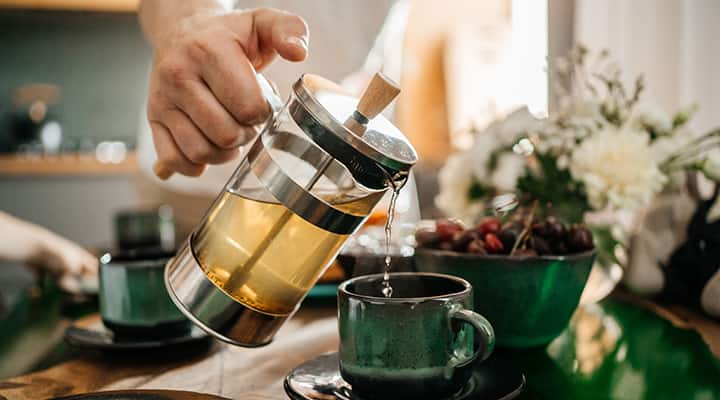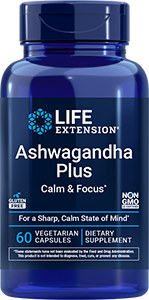
5 Types of L-Theanine-Rich Tea: Boost Your Calm Naturally
Published: March 2025
Some of us turn to bubble baths to unwind before sleep at the end of the day, while others reach for a soothing cup of tea. But did you know your tea benefits your health in more ways than one? Beyond its comforting warmth, which feels like a hug in a cup, certain teas contain L-theanine, a powerful amino acid known for promoting calm.
Here is everything to know about L-theanine, plus five teas containing this calming amino acid that are perfect for your next moment of relaxation.
How does L-theanine make you feel?
L-theanine is known for promoting a sense of calm and wakeful relaxation, without causing sleepiness. In fact, studies have found L-theanine encourages brainwave patterns similar to meditation and massage.
L-theanine is often compared to ashwagandha, with good reason. Ashwagandha is an Ayurvedic herb that has been found to support a healthy response to everyday stress. It also encourages already-healthy levels of the stress hormone cortisol, which can help you sleep at night and promote emotional well-being.
L-theanine and ashwagandha are both known for healthy stress management, but they differ in their mechanism of action.
Why is L-theanine good for my brain?
Revered for its ability to promote relaxation by helping to support a healthy stress response, L-theanine is a unique amino acid known to encourage a healthy mood and a calm state of mind. L-theanine's effects stem from its role in the production of gamma-aminobutyric acid, which is a neurotransmitter that influences levels of dopamine and serotonin, both of which influence mood, focus and overall health.
Studies have found that L-theanine produces calming effects by favorably modulating several aspects of brainwave activity.
L-theanine from teas
The richest natural source of L-theanine is tea. For drinking your way to calm, try incorporating one of these five teas, all of which contain L-theanine, into your diet. While they differ in flavor and nutrition, they all come from the Camellia sinensis plant, making them natural sources of L-theanine.
Green tea
. Green tea is the best-known food source of L-theanine. Whether you opt for plain green tea, jasmine green or tea flavored with herbs like ginger, mint or chai spices, you will reap the calming activity of L-theanine in every sip. Green tea is also valued for its EGCG content, a powerful antioxidant that helps protect cells from oxidative stress. Green tea can be enjoyed hot or iced, or even baked into cupcakes.Matcha
. Matcha is a vibrant powdered green tea from Japan that has become increasingly popular in the US. Because you consume the whole tea leaf in powdered form rather than steeping it, matcha delivers more concentrated doses of L-theanine than traditional steeped tea. All grades, including ceremonial, culinary and flavored varieties, support healthy energy with a soothing effect.Black tea
. For a bold and robust option, turn to black tea. You'll reap the benefits of L-theanine content whether you choose to sip on English or Irish breakfast tea, Earl Grey, or regional varieties such as Ceylon, Darjeeling, Assam and Yunnan. Black tea is rich in a group of bioflavonoid compounds called theaflavins that support cell health in a range of ways, including by acting as antioxidants and promoting a healthy inflammatory response, to help your body function at its best.Oolong tea
. With its smooth and floral notes, oolong strikes a balanced flavor profile between black and green tea. While oolong tea typically contains less caffeine than black tea, this can vary depending on the tea leaves and the brewing method.White tea
. White tea is the least processed of teas, which helps preserve its delicate, naturally sweet flavor. On average, white tea contains the second-most L-theanine content of these five tea types, less only than green tea, with a similar amount of caffeine as other types of tea.
Explore Our Best Stress Management Supplements
Can I take L-theanine with caffeine?
The combination of L-theanine and caffeine has been tested in clinical trials, and studies found that L-theanine helps enhance the positive effects of caffeine. Findings suggest the combination promotes alertness and cognitive performance, encourages speed and accuracy on attention-demanding tasks, and helps reduce susceptibility to distraction.
So next time you need to support concentration and enhance your performance on cognitively demanding tasks, drinking tea with both L-theanine and caffeine may help.
What is the recommended daily intake for L-theanine?
The dose for science-based L-theanine supplements like Theanine XR™ Stress Relief is 400 milligrams of L-theanine once per day. Unformulated L-theanine is often recommended at the same 400 milligram dose, once or twice per day. You can also get L-theanine from drinking a nice, hot cup of tea, but it is important to note: If you try to get the same L-theanine content from drinking tea, you'll also be consuming caffeine. This may lead to more stimulation than you desire.
Supplements are a good way to reap the calming effects of L-theanine without feeling sleepy or buzzed from too much caffeine. Also, L-theanine supplements that use extended-release technology help you stay on an even keel all day long.
Looking for supplements to help support your mood health? Life Extension's health needs quiz can suggest nutrition tailored to you.
References
- Boros K, et al. "Theanine and Caffeine Content of Infusions Prepared from Commercial Tea Samples." Pharmacogn Mag. January-March 2016. https://pmc.ncbi.nlm.nih.gov/articles/PMC4787341/
- Giesbrecht T, et al. "The combination of L-theanine and caffeine improves cognitive performance and increases subjective alertness." Nutr Neurosci. December 2010. https://pubmed.ncbi.nlm.nih.gov/21040626/
- Kahathuduwa CN, et al. "Effects of l-theanine–caffeine combination on sustained attention and inhibitory control among children with ADHD: a proof-of-concept neuroimaging RCT." Scientific Reports. August 2020. https://www.nature.com/articles/s41598-020-70037-7
- Kochman J, et al. "Health Benefits and Chemical Composition of Matcha Green Tea: A Review." Molecules. December 2020. https://pmc.ncbi.nlm.nih.gov/articles/PMC7796401/
- Li MY, et al. "L-Theanine: A Unique Functional Amino Acid in Tea (Camellia sinensis L.) With Multiple Health Benefits and Food Applications." Front Nutr. April 2022. https://pubmed.ncbi.nlm.nih.gov/35445053/
- Owen GN, et al. "The combined effects of L-theanine and caffeine on cognitive performance and mood." Nutr Neurosci. August 2008. https://pubmed.ncbi.nlm.nih.gov/18681988/
- Shigeta M, et al. "Matcha green tea beverage moderates fatigue and supports resistance training-induced adaptation." Nutr J. July 2023. https://pubmed.ncbi.nlm.nih.gov/37403052/
- Truong VL, Jeong WS. "Antioxidant and anti-inflammatory roles of tea polyphenols in inflammatory bowel diseases." Food Science and Human Wellness. May 2022. https://www.sciencedirect.com/science/article/pii/S2213453021001361
Always be in the know!
Access the latest deals, wellness news, expert health tips & more!









